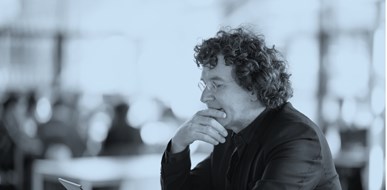DILEMA Lecture by Peter-Paul Verbeek
Published 18 March 2021
On Monday 12 April 2021 at 13:00 CET, Professor Peter-Paul Verbeek (University of Twente) will deliver a DILEMA lecture on the topic of ‘Artificial Intelligence and Ethical Disruption’. The lecture will be followed by a Q&A moderated by Dr Sadjad Soltanzadeh, Postdoctoral Researcher in Ethics and Philosophy of Technology with the DILEMA Project.
Click here to register for this event.
Abstract
Artificial Intelligence is an ethically disruptive technology: it challenges the very ethical concepts and frameworks with which it can be evaluated itself. AI systems bring radically new human-technology relations: rather than merely being ‘used’, they develop forms of ‘agency’ of their own, performing cognitive and physical tasks, and creating a new, technological environment. Moreover, they typically work on the human mind: AI interferes with human interpretations, decision-making, and creativity. Concepts like agency, responsibility, and intentionality, therefore, need to be reinterpreted in order to develop an adequate ethical approach to AI.
In this lecture, Professor Verbeek will address this ethical disruption in three steps. First, he will analyze the new human-technology relations that AI brings: how do digital technologies affect human practices, decisions, and interpretive frameworks? And how do new, hybrid forms of intentionality emerge from this, in which human and technological intentionalities are connected in novel ways? Second, he will investigate how these new human-technology relations challenge central ethical concepts and frameworks. How to understand the influence of digital technologies on moral actions, decision-making and value frameworks? Finally, he will explain how the approach of ‘guidance ethics’ can be helpful to address the ethical challenges that AI brings.
About the Speaker
Peter-Paul Verbeek (1970) is Distinguished Professor of Philosophy of Technology at the Department of Philosophy and scientific co-director of the DesignLab of the University of Twente. He is also honorary professor of Techno-Anthropology at Aalborg University, Denmark, chairperson of the UNESCO World Commission on the Ethics of Science and Technology (COMEST) and member of the Domain Board Social Sciences and Humanities of the Dutch Research Council NWO.
His research focuses on the philosophy of human-technology relations, and aims to contribute to philosophical theory, ethical reflection, and practices of design and innovation. He is currently one of the 6 Principal Investigators of a 10-year research program on the Ethics of Socially Disruptive Technologies. His work has received several awards, including the World Technology Award in Ethics. Book publications include Moralizing Technology: Understanding and Designing the Morality of Things and What Things Do: Philosophical Reflections on Technology, Agency, and Design. Recently, he co-developed the Guidance Ethics Approach, to empower citizens, designers, and professionals to connect ethical reflection and technical innovation.
About the DILEMA Lecture Series
The DILEMA Lecture Series regularly invites academics and other experts working on issues related to the DILEMA project to present their work and share reflections with a general audience comprising researchers, students, and professionals. Topics of interest within the scope of this lecture series include technical perspectives on military applications of AI, philosophical inquiries into human control and human agency over technologies, analyses of international law in relation to (military) AI, including international humanitarian law and international human rights law, and interdisciplinary contributions related to these topics

